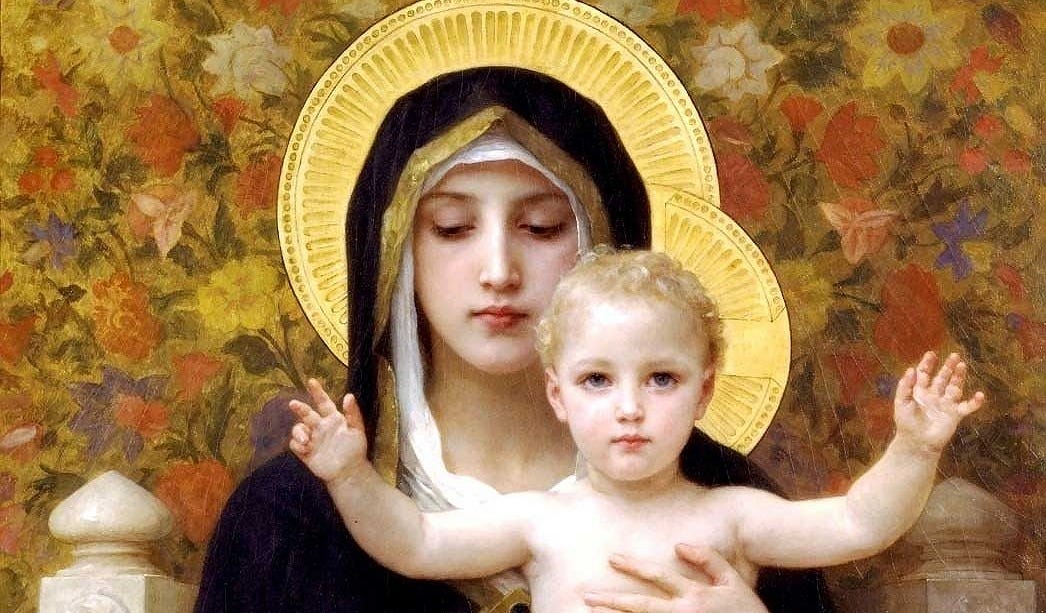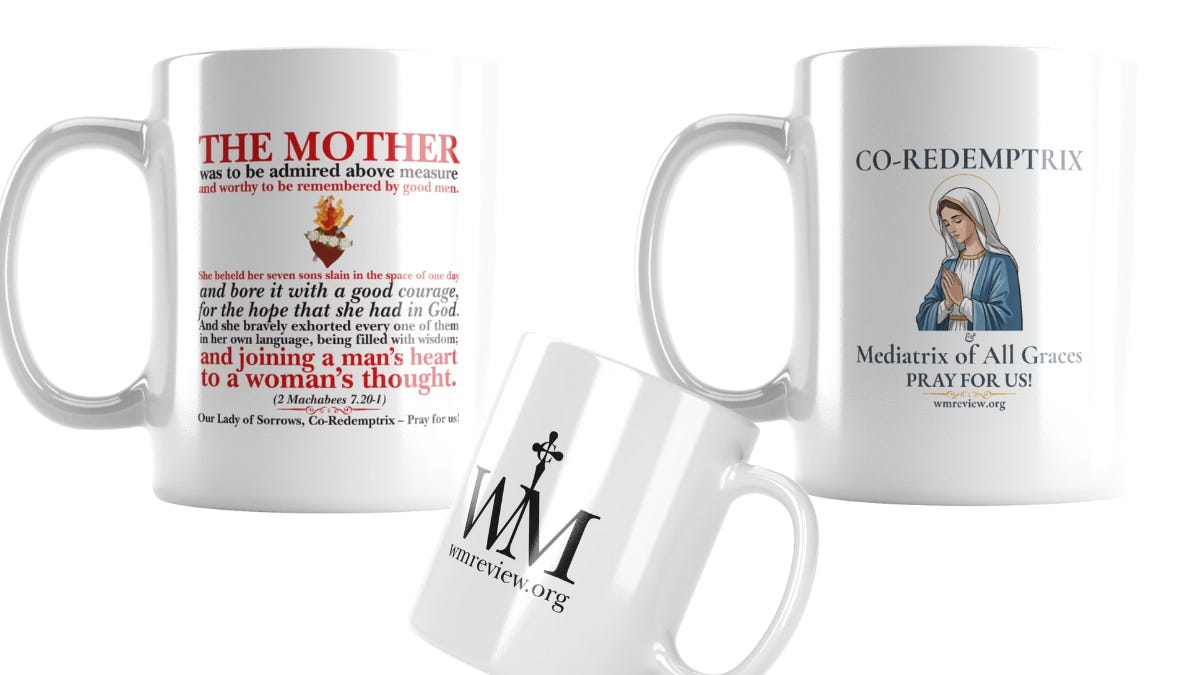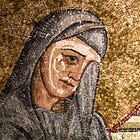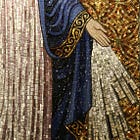Mediatrix: 'Theologically certain' (Garrigou-Lagrange)
Fr Réginald Garrigou-Lagrange OP considers the theological note of the 'Mediatrix of All Graces' doctrine – and makes a surprising comparison with two defined dogmas.

Fr Réginald Garrigou-Lagrange OP considers the theological note of the ‘Mediatrix of All Graces’ doctrine – and makes a surprising comparison with two defined dogmas.
Editors’ Notes
On 4 November, 2025, the Vatican’s Víctor Manuel Cardinal Fernández (Prefect for the “Dicastery of the Doctrine of the Faith”), released a note on Marian piety.
This note spoke against the widespread titles of “Mediatrix” and “Mediatrix of All Graces.” It suggested that such titles lack solid grounding in Revelation, and carry “limits that do not favor a correct understanding of Mary’s unique place.”
In fact, this title also enjoys a very solid basis in Catholic tradition, having been used on several occasions by the Roman Pontiffs.
In the following text, Fr Réginald Garrigou-Lagrange OP considers the degree of certainty that this proposition holds, and explains that it is theologically certain. The BAC Sacrae Theologiae Summa series offers the following definition for this note:
“Theologically certain (theologice certa): a truth that in the theological schools is certainly recognized as necessarily connected with revealed truths; this connection can be either virtual or presupposition or final. The opposite is: error in theology.”
Fr Sixtus Cartechini SJ offers an alternative expression:
“A truth logically following from one proposition which is Divinely revealed and another which is historically certain.”
In other words, the conclusion of Our Lady’s universal mediation of all graces cannot be denied without also denying a) a premise based on a truth of divine revelation, or b) a premise based on a truth of reason.
Intriguingly, writing before the definition of the Assumption, Garrigou-Lagrange considered this universal mediation to be the more easily defined truth – and subject to fewer and weaker objections than the Immaculate Conception was.
“As a matter of fact, the difficulties which are raised against Mary’s universal mediation are much less serious than those raised against the Immaculate Conception in the 13th century. The Assumption is usually looked on as capable of definition; Mary’s universal mediation seems to be even more certain, if we consider the principles which underlie it: the divine maternity, the motherhood of men, and the venerable tradition which contrasts Mary and Eve.”
Let us proceed to consider his arguments.
Before we continue – if you feel strongly about this issue, why not demonstrate that in mug form?
Mary’s Universal Mediation in General
Fr Réginald Garrigou-Lagrange OP
Mother of the Saviour and Our Interior Life
Chapter III: Mary’s Universal Mediation in Heaven
The Universality of Mary’s Mediation and its Definability
In this article we shall consider the universality of Mary’s mediation, the degree of certainty we have concerning it, and its precise meaning.
As a matter of fact the universality of Mary’s mediation follows so evidently from the principles we have established that the onus of proof lies altogether on our opponents.1 Mary Mother of the Redeemer and Co-Redemptrix has merited de congruo all that Jesus has merited for us and has made satisfaction in union with and in dependence on Him. Does it not follow that she can obtain in heaven the application of the fruits of these merits, and that she thereby obtains for us not only all graces in general but all graces in particular?
This assertion is more than a pious opinion, however probable. It is theologically certain in virtue of the principles on which it rests, it has been commonly accepted by theologians, it has been part of the Church’s preaching and has been confirmed by the encyclicals of different Popes. To quote but one striking papal pronouncement, we find Pope Leo XIII teaching in the encyclical Octobri Mense on the Rosary, September 22nd, 1891:
“Nihil nobis nisi per Mariam, Deo sic volente, impertiri.”
(No grace is given to us except through Mary, such being the Divine Will. – Denz. 3033)
The universality of Mary’s mediation is affirmed also in the prayers of the Church, which are an expression of her faith. Graces of every kind, temporal and spiritual—and among these latter all those which lead to God, from the grace of conversion to that of final perseverance—are asked through Mary. She is prayed also for the graces needed by apostolic workers, by martyrs in time of persecution, by confessors of the faith, by virgins that they may preserve their virginity intact, etc. The Litany of Loretto gives some idea of the many graces which the Church asks through her intercession.
Thus through her are granted all the graces all men need, in their different conditions and stages of life. It has been so for twenty centuries: it will remain so till the end of time. Mary obtains for us all we need for our journey towards eternity.
Among all the different graces that which is the most peculiar to any particular wayfarer is the grace of the moment in which he finds himself. That too comes through Mary. We pray for it daily and many times each day when we say “Pray for us sinners, now and at the hour of our death.” By the word “now” we ask for the grace required to fulfil the duty of the present moment, to practise this or that virtue asked of us here and now. Even if we do not ourselves realise what grace we need, Mary in heaven does, and it is through her intercession that we obtain it. The succession of graces of the moment, varying from one moment to the next, is like a spiritual atmosphere which we inhale and which renews our souls as air does the blood.
Mary’s mediation is therefore truly universal: such is the teaching of Tradition. It extends to the whole work of our salvation, without being limited to graces of any particular kind. On this point, there is moral unanimity of the Fathers and Doctors of the Church, and of the faithful whose belief is expressed in the liturgy.
Definability of the Doctrine
It would appear that the doctrine of Mary’s universal mediation is capable of being defined as a dogma of faith, for it is implicitly revealed in the different titles which Tradition gives Mary—that of Mother of God, most powerful in intercession with her Son, that of the new Eve intimately associated with the Redeemer, that of Mother of all men. Besides, it is a doctrine explicitly and formally affirmed by the morally unanimous consent of Fathers and Doctors of the Church, of preaching throughout the Church, and of the Liturgy.
Leo XIII, after having stated that we receive nothing except through Mary, goes on to say that “as no one can come to the Father except by the Son, in much the same way (ita fere) no one can come to the Son except by Mary”.2 Pius X calls her “the dispensatrix of all the graces which Jesus acquired for us by His blood”.3 Benedict XV gave his approval to the same doctrine when he instituted the universal feast of Mary, Mediatrix of all graces.4
Mary’s universal mediation appears then to be capable of definition as a dogma of faith: it is at least implicitly revealed and it is already universally proposed by the ordinary magisterium of the Church.
What is the Precise Meaning of this Universality?
A number of preliminary remarks will be necessary in order to arrive at the precise meaning of Mary’s universal mediation.
In the first place, all the graces received by men from the Fall up to the Incarnation were granted in view of the foreseen merits of the Saviour—with which we must associate those of His Mother—but neither Jesus nor Mary distributed or transmitted them. This limitation was removed with the coming of the Saviour on earth in human flesh. As for Mary, it is especially since her Assumption into heaven that she knows the spiritual needs of all men and that she intercedes for them and distributes the graces they need.
Since Mary distributes all that she has merited, it follows that she distributes the graces we receive in the sacraments. She does this at least by giving us the grace of being disposed for their reception, and sometimes even by sending us a priest without whose ministry we could not have received them.5
Mary’s universal mediation should not be understood as if it meant that no grace is given to us without our having asked it explicitly of her; that would be to confuse our prayer to her with her prayer to God. Mary does in fact ask for graces without being invoked explicitly. Many graces are given to both children and adults even before they pray for them, especially the grace of beginning to pray. The Our Father can be said without any explicit invocation of Mary; but she is invoked implicitly in it when it is said according to the order established by divine providence.
It should not be thought either that Mary was Mediatrix for herself. She obtained her fulness of grace through the mediation of her Son.
It would, however, be an error by defect to say that Mary merited nearly all graces, or morally all graces—say, something like eight or nine tenths of them. All graces without exception come by her mediation. Such is the general law established by divine providence, and there is no known indication of any exceptions.6
A point which distinguishes Mary’s mediation from that of the saints is that she is mediatrix de jure and not simply de facto for all men, since she is the mother of all. This makes her intercession all-powerful. Her prayers are more efficacious than those of all the saints united. The saints can do nothing without her intercession for the reason that it is universal.7
Mary’s universal mediation extends to the souls in Purgatory.
“It is certain that the Mother of Mercy knows the needs of these souls… She can bring her satisfaction to the support of her prayers… she did not need it for herself but has given it all into the hands of the Church who distributes it to souls in the form of indulgences… Thus when the satisfaction of Mary is applied to the poor debtors of Purgatory, they have a kind of right to deliverance since they pay their debt with what is their own… She obtains also that her children on earth pray for her clients in Purgatory, offer good works for their intention, and have the sacrifice of redemption offered for them… She can obtain also that prayers destined for souls who do not need them or who are not capable of benefitting by them should be made available for the children of her special love.”8
In the same spirit a Doctor of the Church, St. Peter Damien, assures us that on every Feast of the Assumption many thousands of the souls captive in Purgatory are delivered.9 St. Alphonsus de Liguori adds, quoting Denis the Carthusian, that such liberations take place most particularly on the Feasts of Christmas and the Resurrection. Though these testimonies do not impose themselves on our faith for acceptance, they point to and, in their own way, explain Mary’s mediation.
Some Difficulties
The objection has been raised: the mother of a king has not the right to dispose of his treasures; neither then has Mary the right to dispose of the graces which Jesus has merited.
There is no parity between the two cases.10 The mother of a king is simply the mother of a child who subsequently became king and, more usually than not, she has not co-operated closely with him in his government. But Mary is Mother of God the Redeemer, Universal King, by the simple fact of her divine maternity. She has given Him His human nature and she has been intimately associated with Him in His redemptive sufferings and in His merits. She shares therefore in His spiritual royalty and has the right, in subordination to Him, to dispose of the graces He—and she—acquired.
Another objection is that Mary’s universal mediation is no more than becoming or appropriate, and therefore cannot be affirmed with certainty.
We may answer that the becomingness or appropriateness in question is more than ordinary. It is based on Mary’s divine maternity, on her spiritual motherhood of men, on her union with the Redeemer, and is so connected with them that its opposite would be unbecoming. It is connatural to the spiritual mother of all men to watch over them and to distribute to them the fruits of the Redemption. And—what is still more conclusive—Tradition shows that God has in fact disposed the scheme of our Redemption in accordance with this becomingness. This is the teaching of the Fathers of the Church, of the Doctors of the Middle Ages, and of later theologians, who all in their own way have thrown the universality of Mary’s mediation into clearer relief.
Conclusion
There is therefore no serious difficulty against defining Mary’s universal mediation as a dogma of faith, provided it is understood as we have indicated: as a mediation subordinate to that of Jesus and depending on His merits; as a mediation which is not considered to add any necessary complement to Jesus’ merits, the value of which is infinite and superabundant, but which shows forth the influence and fruitfulness of those same merits in a soul fully conformed to Him.
As a matter of fact, the difficulties which are raised against Mary’s universal mediation are much less serious than those raised against the Immaculate Conception in the 13th century. The Assumption is usually looked on as capable of definition; Mary’s universal mediation seems to be even more certain, if we consider the principles which underlie it: the divine maternity, the motherhood of men, and the venerable tradition which contrasts Mary and Eve.
Since this is so, and since the ordinary magisterium of the Church makes Mary’s universal mediation to be theologically certain, we can only hope and pray that it be one day defined so as to increase devotion to her who is the watchful and loving Mother of all men.
Mary’s mediation in no way obscures that of Jesus. Her mediation is but a share in His: her merits have been acquired under His influence, and it is He Who confers on her the dignity of being a cause in the order of salvation and sanctification. History shows, too, that devotion to Mary has been lost by those nations precisely which have lost their devotion to Jesus, whereas those which have been the first to honour Mary have also been the first in their faith in the redemptive Incarnation. When Dr. Pusey objected to Fr. Faber’s statement: “Jesus is obscured because Mary is kept in the background,” Newman answered that its truth “exemplified in history might be abundantly illustrated… from the lives and writings of holy men in modern times”.11 As examples he quoted St. Alphonsus de Liguori and St. Paul of the Cross, in whom ardent love of Jesus was inseparable from great devotion to Mary.
True cult of Mary, like her action upon us, leads surely to intimacy with Jesus. Far from diminishing our intimacy with Jesus it increases it, just as the action of the Holy Soul of Jesus increases our union with the Blessed Trinity.
The universality of Mary’s mediation will become more evident when we consider in the next chapter that she is Mother of Mercy.
HELP KEEP THE WM REVIEW ONLINE WITH WM+!
As we expand The WM Review we would like to keep providing free articles for everyone.
Our work takes a lot of time and effort to produce. If you have benefitted from it please do consider supporting us financially.
A subscription gets you access to our exclusive WM+ material, and helps ensure that we can keep writing and sharing free material for all.
You can see what readers are saying over at our Testimonials page.
(We make our WM+ material freely available to clergy, priests and seminarians upon request. Please subscribe and reply to the email if this applies to you.)
Subscribe to WM+ now to make sure you always receive our material. Thank you!
If you enjoyed this article, why not get the mugs?
Read Next:
The Foot of the Cross: Or the Sorrows of Mary (Fr Faber)
Mariology, Vol. II (Fr Juniper Carol OFM)
Mariology (Fr Matthias Scheeben)
Mother of the Saviour and our Interior Life (Fr Garrigou-Lagrange)
Sacrae Theologiae Summa IIIA: On the Incarnate Word, On the Blessed Virgin Mary
Follow on Twitter, YouTube and Telegram:
Among the opponents we may mention the Jansenists who wished to modify the line Bona cuncta posce of the Ave Maris Stella, since by it we ask Mary for all the graces which lead us to God.
Denz. 3033.
Denz. 3033.
Denz. 3034.
Cf. Dict. Théol. Cath., art. Marie (E. Dublancy), col. 2403: The doctrine of the universal mediation of Our Lady
“… is true of all the supernatural graces which proceed from the Redemption. This conclusion, which is without restriction, applies to the graces of the sacraments, in this sense that the dispositions which one should bring to their reception, and on which the infusion of grace depends, are obtained through Mary’s intercession.”
Cf. Merkelbach, Mariologia, p. 375.
This is what St. Anselm taught. Or. 46:
Te tacente, nullus (sanctus) orabit, nullus invocabit,
Te orante, omnes orabunt, omnes invocabunt.
Hugon, O.P., Marie, pleine de grâce, edit. 5, 1926, p. 201.
Ep. 52 and Opusc. XXIV: Disp. De variis apparat. Et miraculis.
Cf. Merkelbach, Mariologia, p. 377.
Difficulties felt by Anglicans in Catholic Teaching, 4th edit., p. 440.









Mater Dei Fidelis contains nothing a Protestant would object to, which is clearly stated as its intention. Not surprising, as the Conciliar Church is "protestant" at least in the sense of rejecting theologically certain Catholic teaching as outlined above.
As even the post-conciliar popes claimed belief in the apparition of Fatima, it is telling that the two last means remaining for us will be the Holy Rosary and devotion to the Immaculate Heart of Mary, as God had Her deliver this message, not a message of direct appeal to Him, the Son, and the Holy Ghost. As it was through Her that the Head of the Catholic Church was delivered for our redemption, so it will be through Her that His Mystical Body will be delivered from its current heretical persecution. Small wonder that the Conciliar Church wants to diminish Her role.
Thank you so much for this, @WM Review!✨🩵✝️